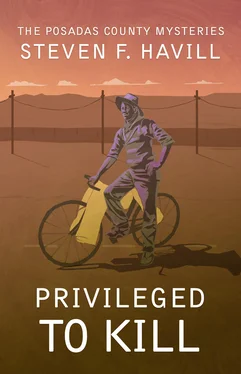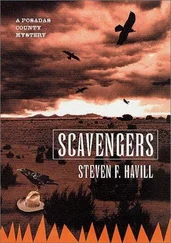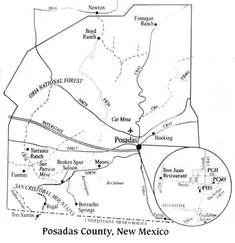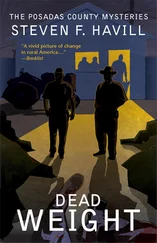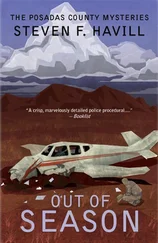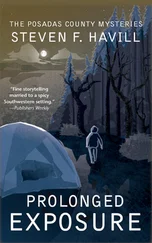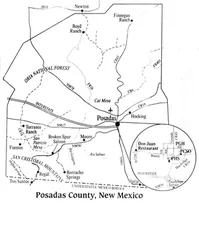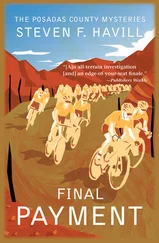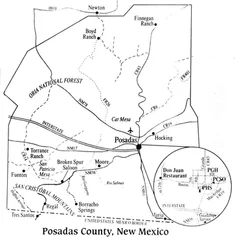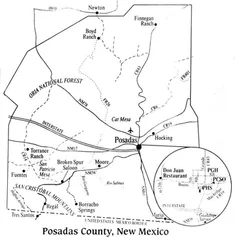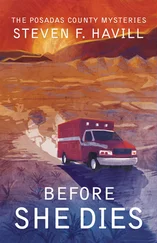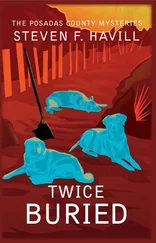Steven Havill - Privileged to Kill
Здесь есть возможность читать онлайн «Steven Havill - Privileged to Kill» весь текст электронной книги совершенно бесплатно (целиком полную версию без сокращений). В некоторых случаях можно слушать аудио, скачать через торрент в формате fb2 и присутствует краткое содержание. Год выпуска: 2011, ISBN: 2011, Издательство: Poisoned Pen Press, Жанр: Полицейский детектив, на английском языке. Описание произведения, (предисловие) а так же отзывы посетителей доступны на портале библиотеки ЛибКат.
- Название:Privileged to Kill
- Автор:
- Издательство:Poisoned Pen Press
- Жанр:
- Год:2011
- ISBN:978-1-61595-232-8
- Рейтинг книги:5 / 5. Голосов: 1
-
Избранное:Добавить в избранное
- Отзывы:
-
Ваша оценка:
- 100
- 1
- 2
- 3
- 4
- 5
Privileged to Kill: краткое содержание, описание и аннотация
Предлагаем к чтению аннотацию, описание, краткое содержание или предисловие (зависит от того, что написал сам автор книги «Privileged to Kill»). Если вы не нашли необходимую информацию о книге — напишите в комментариях, мы постараемся отыскать её.
Privileged to Kill — читать онлайн бесплатно полную книгу (весь текст) целиком
Ниже представлен текст книги, разбитый по страницам. Система сохранения места последней прочитанной страницы, позволяет с удобством читать онлайн бесплатно книгу «Privileged to Kill», без необходимости каждый раз заново искать на чём Вы остановились. Поставьте закладку, и сможете в любой момент перейти на страницу, на которой закончили чтение.
Интервал:
Закладка:
“I’ll be over in about fifteen minutes.” I hung up, wondering why she’d bothered to call to remind me. To the best of my recollection, in all my sixty-four-plus years I had never forgotten a meal. Skipped a few thousand, certainly, when things got hectic. But never forgotten.
I dressed in my most comfortable civilian uniform-brown boots, khaki trousers, and checkered flannel shirt-and then took my time backing the Blazer out of the garage. I’d owned it for less than two months and hadn’t yet put the obligatory scratch on it that would then allow me to treat it like the truck it was.
The Guzmans lived on South Twelfth Street, a street name that made Posadas sound like more than the sleepy village it was. I headed for their place by my usual direct route, under the interstate on Grande, then north to the intersection with Bustos Avenue by Pershing Park.
I wasn’t sure what I was looking at, or thinking about. Maybe it was the cloud bank off in the southwest, hanging low over the San Cristobal mountains, promising the first fall storm. Maybe I was wondering what Wesley Crocker had found in his exploration of Bennett’s Road north of town. Maybe I was still stewing about Maria Ibarra. Who the hell knew.
Whatever it was that preoccupied my mind, it was a good thing that our postmistress, Carla Champlin, was looking where she was going. My shiny new Blazer, with 206 miles on the odometer, sailed right through the stoplight at Grande and Bustos. I realized the light was red only after I’d passed underneath it, commanding the intersection like I owned the road. The spinster Champlin, bless her heart, saw me coming, and had time to stand on the brakes for all her spindly legs were worth.
Her eastbound station wagon screamed to a halt in a cloud of blue rubber smoke, skewed slightly sideways as she wrenched the steering wheel to the left. Her vehicle’s bumper missed bashing the Blazer’s left rear quarter-panel by inches. I didn’t even have time to wave a greeting. As if no one were on the street but me, I continued through the intersection and turned westbound on Bustos.
When my heart started beating again and I stopped swearing, I glanced in my rearview mirror. Her car was pulling away, none the worse for wear except for the flat spots on her tires. It was twilight, and perhaps in the failing light she hadn’t recognized me. I knew that was wishful thinking, since she’d had a broadside view of my startled face. Besides that, Carla Champlin never missed anything. I would get the full withering treatment next time I snuck in the post office.
I took a deep breath and muttered a curse-studded prayer of thanksgiving that Posadas was tiny, it was dinner hour, the football game was out of town, and that every other grace had resulted in there being only Carla Champlin and me on the street at that moment.
Estelle Reyes-Guzman opened the door before my finger could touch the doorbell. She took one look at my face and her eyes narrowed. As she stepped aside to let me in, her head cocked a little sideways. Her radar was working overtime, and as usual, it was dead accurate.
“What happened?” she asked, not sounding worried, but rather conversational, as if I were inspecting the sole of my boots after walking past the dog run. Before I could answer, the Guzman’s two-year-old son catapulted into the room, saw me, and stopped short.
“ Padrino is here!” Francis Jr. bellowed and charged toward me. How the genes of two such reserved and quiet parents had produced this tiny human windbag, even Gregor Mendel wouldn’t be able to figure out. A lusty roar was the kid’s idea of a whisper. I cringed from the attack, not because I didn’t like the child, but because I was feeling a little frail around the edges. Estelle gracefully intercepted him and locked him in a bear hug.
“Yes, kid , he’s here,” Estelle said, nuzzling his ear and using my nickname for Francis Jr. The two-year-old squirmed and cackled, but Estelle held him fast. She looked at me, eyes still assessing. “You look pale, sir.”
I tossed my baseball cap on their sofa, and like a small two-legged retriever the kid twisted out of his mother’s grip and tore after the cap, seized it, and pulled it down on his head to the bridge of his nose.
“I ran the red light at Grande and Bustos,” I said and shrugged. Estelle looked puzzled, and I held up my hands. “That’s it. I ran the light.”
“No one else…”
I shook my head. “Carla Champlin was coming the other way. She managed to miss me. I’m sure I scared the zip code out of her, though.” I grinned sheepishly. “If she had scratched my truck, I’d have had to shoot her.”
Estelle’s smile was only the faintest of twitches at the corners of her mouth. Her dark eyes weren’t amused.
“Hey,” I said, “it happens now and then.”
“Let’s eat,” she said, and beckoned me toward the dining room.
“Where’s the good doctor?” I asked, following her with the blinded two-year-old stumbling at my heels, both hands clutching the bill of my cap.
“He had to run down to the hospital for a few minutes. Cassie Madrid is scheduled for surgery in the morning, and there was some question about her prep meds.” Estelle glanced at me. “He said it would only take a minute. You know how that goes.” She disappeared into the kitchen.
Before I had a chance to comment on Cassie Madrid’s pending cesarean section that would produce child number ten, I heard a car in the driveway. In a moment, Dr. Francis Guzman hustled into the house. In one smooth motion he scooped up his son, tucked him under one arm, and then extended a hand to me. His grip was firm and he was in no hurry to let go.
“Bill, how’s it going?” He pumped the hand another time for good measure, just enough pressure that he didn’t set off my arthritis.
“I’m hungry,” I said. “And this was a nice idea.”
“How’s Cassie?” Estelle asked.
Francis dismissed that story with a wave of a hand. “Nurse can’t read,” he said. He put his hand on top of the kid’s head as if he were about to unscrew the top of a wide-mouthed jar of mayonnaise. “Do you want this creature in his high chair, or feeding out of the dog dish in the kitchen?” he asked as Estelle reappeared with a load of serving bowls and platters balanced on her arm like a professional waitress.
“High chair, next to you.”
Francis Guzman looked eyeball to eyeball with the youngster, both big and little brows furrowed in mock ferocious combat. “But that way he’ll get his food all over me instead of Bill.” The kid screeched and tried to grab my sleeve.
“That’s the general idea,” I said.
Francis laughed. We settled in at the table and Francis said grace in Spanish while his left hand clamped his son motionless in the high chair. I don’t think that the hand was necessary. As soon as he heard his father start to speak, the kid closed his eyes and froze. The truce lasted as long as the prayer. Then Estelle dolloped the makings of an artistic mess on the kid’s unbreakable plate and let him have at it.
“So, how’s the painting going?” Francis said. He grinned at me and when he saw the expression on my face he added, “Estelle was telling me that’s how you were working out your frustrations.”
“Maybe that’s what it was, I don’t know,” I said. I looked at my plate and realized that, despite my best intentions, I wasn’t the least bit hungry. I toyed with the food and then spent four times as long as necessary preparing my iced tea with sugar and lemon juice. While Estelle and Francis chatted about this and that and periodically played referee between the kid and his food, I found my mind wandering.
I had enjoyed probably half a thousand meals at this table over the years, and the Guzman home was an adult version of a safe haven for me when I got too disgruntled at the world and the people in it. But that night, it was as if my mind were somewhere else, trying to pick its way through a fog.
Читать дальшеИнтервал:
Закладка:
Похожие книги на «Privileged to Kill»
Представляем Вашему вниманию похожие книги на «Privileged to Kill» списком для выбора. Мы отобрали схожую по названию и смыслу литературу в надежде предоставить читателям больше вариантов отыскать новые, интересные, ещё непрочитанные произведения.
Обсуждение, отзывы о книге «Privileged to Kill» и просто собственные мнения читателей. Оставьте ваши комментарии, напишите, что Вы думаете о произведении, его смысле или главных героях. Укажите что конкретно понравилось, а что нет, и почему Вы так считаете.
